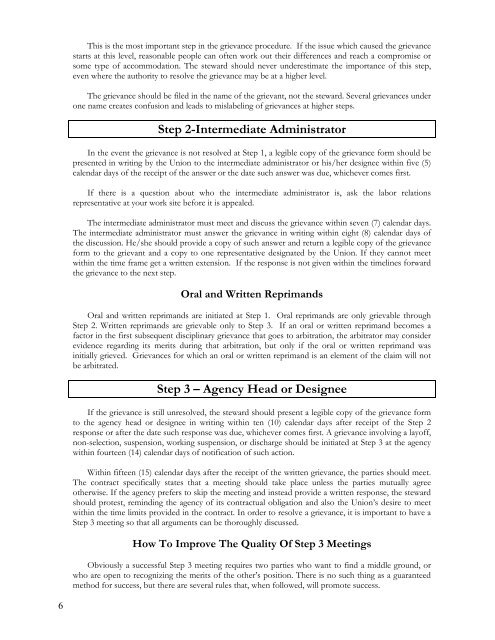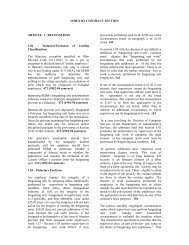Download the Grievance Guide - OCSEA
Download the Grievance Guide - OCSEA
Download the Grievance Guide - OCSEA
You also want an ePaper? Increase the reach of your titles
YUMPU automatically turns print PDFs into web optimized ePapers that Google loves.
This is <strong>the</strong> most important step in <strong>the</strong> grievance procedure. If <strong>the</strong> issue which caused <strong>the</strong> grievance<br />
starts at this level, reasonable people can often work out <strong>the</strong>ir differences and reach a compromise or<br />
some type of accommodation. The steward should never underestimate <strong>the</strong> importance of this step,<br />
even where <strong>the</strong> authority to resolve <strong>the</strong> grievance may be at a higher level.<br />
The grievance should be filed in <strong>the</strong> name of <strong>the</strong> grievant, not <strong>the</strong> steward. Several grievances under<br />
one name creates confusion and leads to mislabeling of grievances at higher steps.<br />
Step 2-Intermediate Administrator<br />
In <strong>the</strong> event <strong>the</strong> grievance is not resolved at Step 1, a legible copy of <strong>the</strong> grievance form should be<br />
presented in writing by <strong>the</strong> Union to <strong>the</strong> intermediate administrator or his/her designee within five (5)<br />
calendar days of <strong>the</strong> receipt of <strong>the</strong> answer or <strong>the</strong> date such answer was due, whichever comes first.<br />
If <strong>the</strong>re is a question about who <strong>the</strong> intermediate administrator is, ask <strong>the</strong> labor relations<br />
representative at your work site before it is appealed.<br />
The intermediate administrator must meet and discuss <strong>the</strong> grievance within seven (7) calendar days.<br />
The intermediate administrator must answer <strong>the</strong> grievance in writing within eight (8) calendar days of<br />
<strong>the</strong> discussion. He/she should provide a copy of such answer and return a legible copy of <strong>the</strong> grievance<br />
form to <strong>the</strong> grievant and a copy to one representative designated by <strong>the</strong> Union. If <strong>the</strong>y cannot meet<br />
within <strong>the</strong> time frame get a written extension. If <strong>the</strong> response is not given within <strong>the</strong> timelines forward<br />
<strong>the</strong> grievance to <strong>the</strong> next step.<br />
Oral and Written Reprimands<br />
Oral and written reprimands are initiated at Step 1. Oral reprimands are only grievable through<br />
Step 2. Written reprimands are grievable only to Step 3. If an oral or written reprimand becomes a<br />
factor in <strong>the</strong> first subsequent disciplinary grievance that goes to arbitration, <strong>the</strong> arbitrator may consider<br />
evidence regarding its merits during that arbitration, but only if <strong>the</strong> oral or written reprimand was<br />
initially grieved. <strong>Grievance</strong>s for which an oral or written reprimand is an element of <strong>the</strong> claim will not<br />
be arbitrated.<br />
Step 3 – Agency Head or Designee<br />
If <strong>the</strong> grievance is still unresolved, <strong>the</strong> steward should present a legible copy of <strong>the</strong> grievance form<br />
to <strong>the</strong> agency head or designee in writing within ten (10) calendar days after receipt of <strong>the</strong> Step 2<br />
response or after <strong>the</strong> date such response was due, whichever comes first. A grievance involving a layoff,<br />
non-selection, suspension, working suspension, or discharge should be initiated at Step 3 at <strong>the</strong> agency<br />
within fourteen (14) calendar days of notification of such action.<br />
Within fifteen (15) calendar days after <strong>the</strong> receipt of <strong>the</strong> written grievance, <strong>the</strong> parties should meet.<br />
The contract specifically states that a meeting should take place unless <strong>the</strong> parties mutually agree<br />
o<strong>the</strong>rwise. If <strong>the</strong> agency prefers to skip <strong>the</strong> meeting and instead provide a written response, <strong>the</strong> steward<br />
should protest, reminding <strong>the</strong> agency of its contractual obligation and also <strong>the</strong> Union’s desire to meet<br />
within <strong>the</strong> time limits provided in <strong>the</strong> contract. In order to resolve a grievance, it is important to have a<br />
Step 3 meeting so that all arguments can be thoroughly discussed.<br />
How To Improve The Quality Of Step 3 Meetings<br />
Obviously a successful Step 3 meeting requires two parties who want to find a middle ground, or<br />
who are open to recognizing <strong>the</strong> merits of <strong>the</strong> o<strong>the</strong>r’s position. There is no such thing as a guaranteed<br />
method for success, but <strong>the</strong>re are several rules that, when followed, will promote success.<br />
6

















